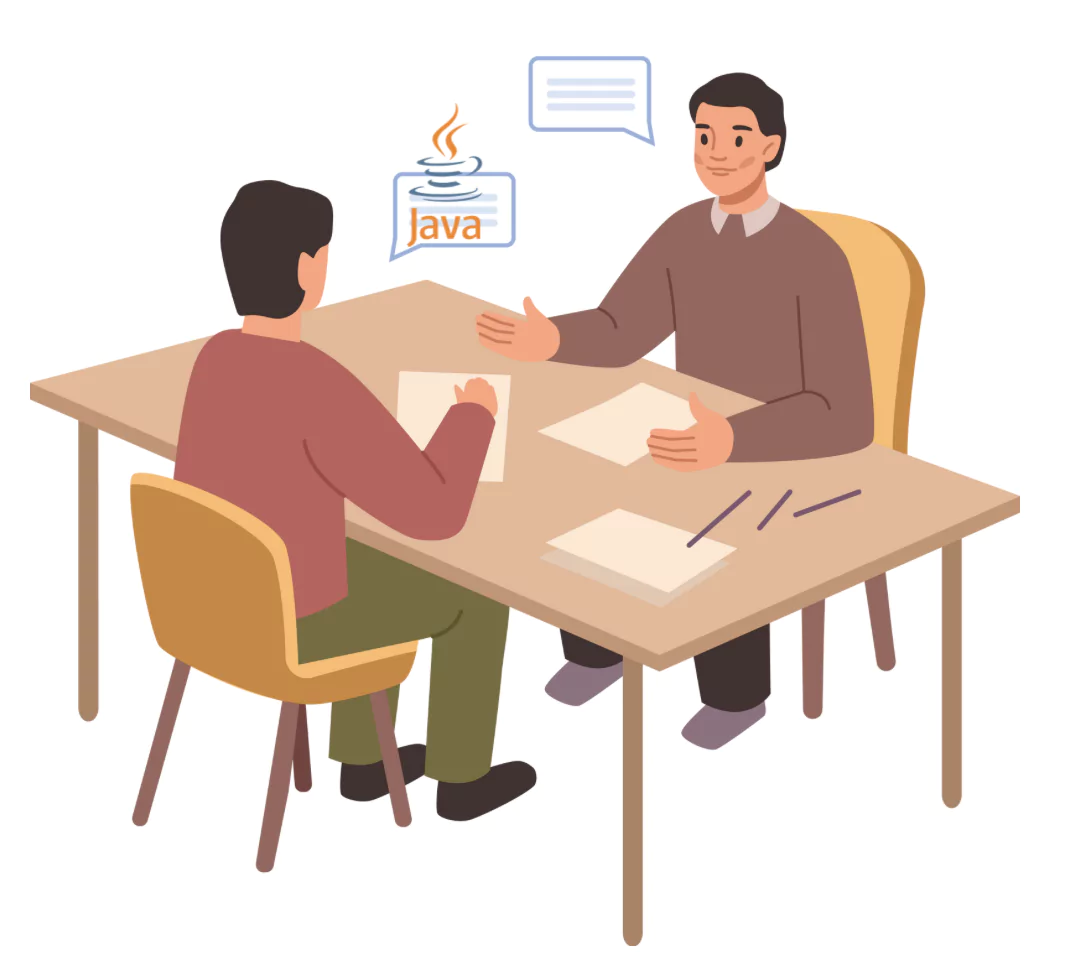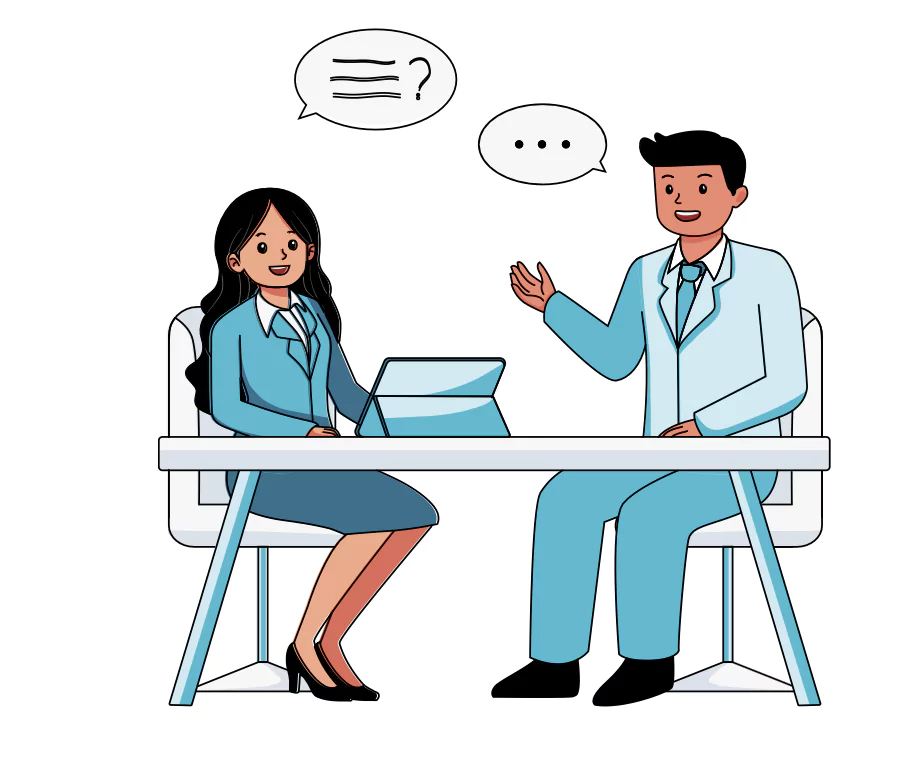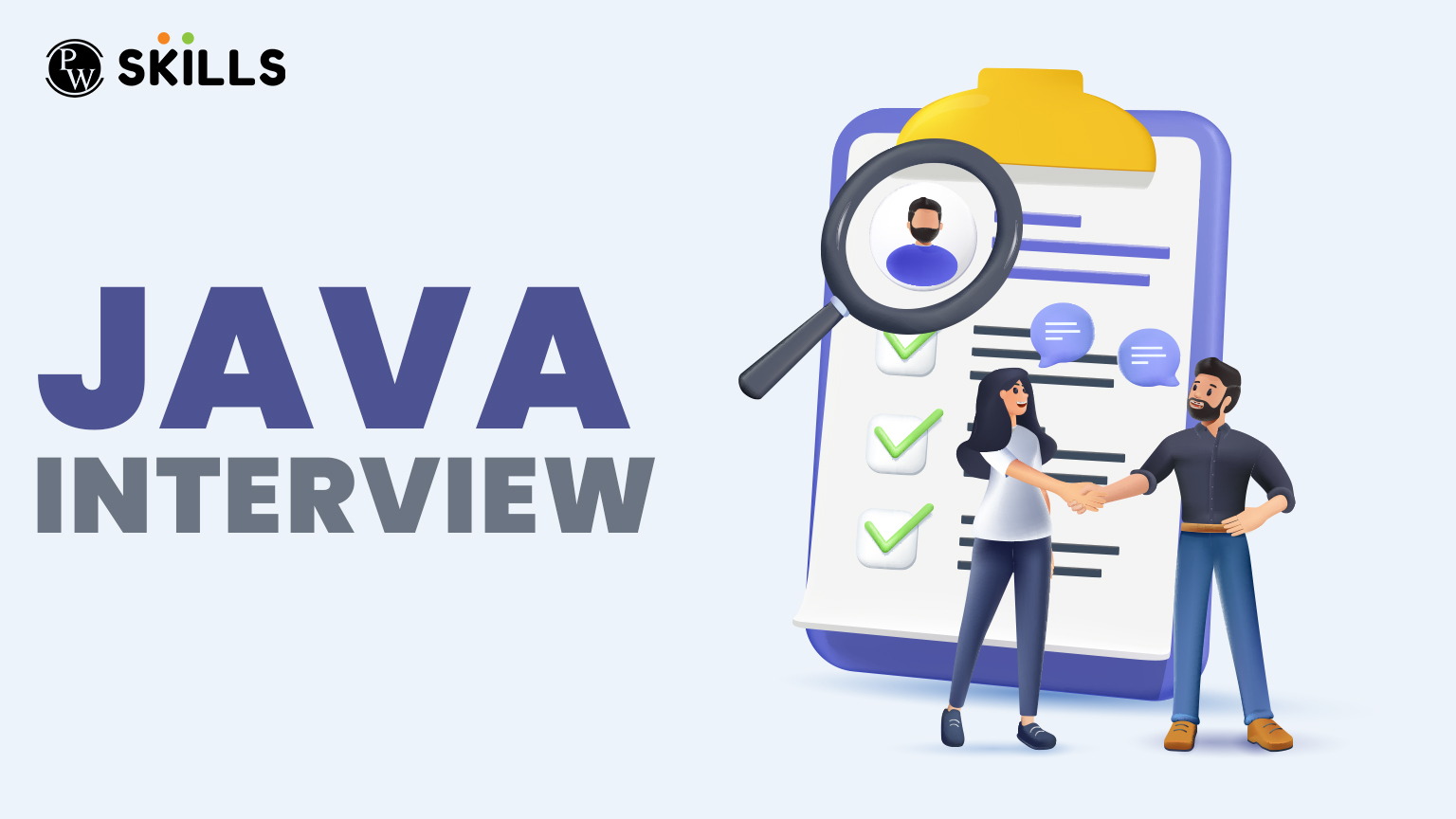Seating and cracking your first Java interview is always a special feeling. But the self doubt that stays on the peak of the first interview is always high and hence, it is important to carefully plan your interview preparation and all the necessary things you need to keep in mind.
If you are familiar with the basics of the Java programming language and important concepts like Spring Boot, Microservices, and Clouds then do not overthink and get yourself prepared for this Java interview.
What Is a Java Interview?
Java Interview generally is the last stage in the recruitment process of a candidate for the position of Java developer. The complete interview is based on different concepts and problem statements kept in front of candidates.

Candidates are assessed on their knowledge of Java programming language. They are assessed on how quick they can build logic and build an optimised code. These interviews can be conducted either in offline or online mode. Candidate must greet their interviewer during the interview and make sure to keep themselves motivated.
Java Interview Core Concepts
Everything can be equally important whatever concepts relate to Java but the main interview drops down to core Java concepts which an interviewer expects a candidate to understand and answer without giving it a thought.
Be very careful while presenting your experience and knowledge in front of the interviewer as they might expand it and ask you questions related to the terms you use. Hence, the best save is to keep in front of the technologies and frameworks you are well familiar with and have a good level of expertise.
Some of the core concepts which you must prepare before your interview day.
- Java Spring Boot
- Microservices
- Data Types & Variables
- OOPs Concepts
- Exception Handling
- Threading
- Memory management in Java
- String Handling
- File I/O Management
- Streams APIs
Knowing these Java concepts will help you clear your first Java interview with ease. It Is also important that you solve enough Java interview questions based on the concepts or topics which are frequently asked during interviews.
Java Interview: Core Concepts, Coding Skills & Soft Skills

The three major parts of a Java interview are the core concepts, coding skills and soft skills where candidates must give focus on all these three concepts to ace the interview preparation.
Core Concepts In Java
Prepare for all the basics of Java programming as the fundamental concepts in Java are frequently asked in interviews.
- Java Data Structure: Arrays, Maps, Lists, etc
- Try & Exception Handling
- OOPs Principle: Polymorphism, Inheritance, Classes, and more.
- Multithreading in Java
- Memory management in Java
- String Handling
- File I/O Management
- Streams APIs
Practice Common Java Interview Questions
Make sure you keep practicing frequently asked questions during Java interviews. You can also filter out the important concepts most frequently asked in the interview.
-
What are the features of Java?
-
What is the difference between JDK, JRE, and JVM?
-
What is the main difference between an abstract class and an interface?
-
What are access modifiers in Java?
-
What is a constructor? How is it different from a method?
-
What is the difference between
==and.equals()in Java? -
What is the purpose of the
finalkeyword in Java? -
What is method overloading and method overriding?
-
What are static methods and variables?
For more such Java interview questions frequently asked for beginners as well as experienced professionals, must check our Java Interview Questions for Beginners & Professionals.
Coding Skills: The Most Vital Part of the Interview
Must develop strong programming skills where you can easily develop logics and build an optimised method of approaching and solving a particular problem.
- Competitive programming skills in Java
- Time & Space Complexity Analysis
- Test Cases
- Problem solving skills
- Debugging Errors in Code
Build Soft Skills & Communication To Crack Interview
Having strong soft skills which includes effective communication and interaction with the interviewer to be able to properly convey your answers to them.
Make sure you do not seem to be lacking confidence, and maintain a good presentation. A good communication includes descriptive answers but in simple understandable form, make sure to make eye contact and avoid fidgeting, and more.
Tips & Tricks for Cracking First Java Interview For Beginners
Let us now get more familiar with some of the most important strategies to follow while preparing for your Java interview.
Master the Basics
To crack a job interview in any field mastering basic concepts must be the first priority. Keep yourself well familiar with the OOPs concept, understand Programming syntax, data types, modifiers, java memory structure, memory management, file manipulation and much more.
Basic concepts are more likely to be tested during the Java interview phase. Hence, make sure you keep yourself well familiar with the basics of these fundamentals of Java.
Practice More & More
Cracking Job interview based on Java programming language requires you to be proficient in programming languages, building quick logics and providing an optimised solution. You must practice different types of questions to help you develop your concept and keep you prepared for your interview.
Build a Preparation Plan
Making a preparation plan and following it throughout your preparation journey is important as it is what makes you ready for your first java interview. Make sure you include all basics, advanced concepts, tools, and frameworks in your preparation plan.
To make your preparation plan more effective join a short term certification course to offer you with expert guidance and appropriate learning materials for your preparation.
Keep Yourself Updated
Make sure you are very well aware about all recent trends and changes taking place in the tech world especially including Java programming language. Make yourself proficient in using new and advanced tools powered with Generative AI.
Work on Industry Level Projects
Develop your concepts by solving real world problems and implement Java logics on these projects to strengthen your concepts in programming as well as Java data structure.
You can contribute to open source projects and even join Java developer communities to learn something new everyday and even help someone with their problem.
Learn by Coding
The best way to prepare for Java interviews is by practicing coding questions every now and then. By coding you will properly be understanding the implementation and best case scenarios of a problem statement. You can use platforms like LeetCode, HackerRank, and more.
Regular Revisions
Make sure you revise everything you learned every week based on a planned approach. Cover a topic in a week and then revise it after a week to keep the concepts fresh in mind and also help you strengthen your concept in that particular topic.
Go through Java cheat sheets, frequently asked interview questions, mock tests and more. Make sure you keep your resume updated and mention only those skills, qualifications or experience which you can explain properly.
Mock Interviews
Take help of many online platforms to prepare for your interview by mock interviews. You will learn how to address a question and more. This will help you build confidence and reduce nervousness.
You can also tell your friends to help you with the mock interviews in case you don’t find a good mock interview platform.
Tips for your Java Interview Day For Beginners

Let us get you prepared for your interview day with some of the best working tips for your interview day.
1. Start the Day Right
Make sure you sleep well before the day of your interview and eat a light meal. Make sure you dress neatly and in-formal attire for your interview day. Dressing well is important whether you have an online or offline interview.
2. Review Key Concepts
Before your Java interview starts make sure you revise the concepts most important for your interview or frequently asked during multiple interviews.
Check your Java cheat sheets and your notes. Do not attempt to go through each and every topic as it might make you nervous. Go through the problems you already solved to boost your confidence for your interview.
3. Prepare Your Mindset
Do not panic by overthinking about the interview, think of it as a conversation and not as a test. Always remember that they care how confident you are and how well you can frame the answers despite knowing the correct answers.
4. Communicate Clearly
Do not rush the answers kept in front of you, take your time and explain the approach before writing the code for the problem. You must use simple and understandable language to help them get clearly whatever it is you want to convey.
Avoid use of any kind of jargon and when you make a mistake kindly acknowledge it which shows that you are aware and you can fix mistakes.
5. Be IDE-Free
It leaves the best impression to the interviewer if you can approach a logic of the problem without using any coding IDE. You can practice it beforehand. Make yourself well familiar with the Java syntax, and try to manually check your code logic through dry run techniques.
6. Be Ready for Common Scenarios
Always keep yourself prepared for the common questions frequently asked during interviews such as questions like reversing a string, duplicates, differences, debugging, and more.
7. Be Honest and Curious
If you do not know something, be ready to accept it and show your interest in learning. When you do not know the answer to a question then you can generously tell them that you are not aware and you can seek the answer in the end.
Read more: Python vs Java: Which Is Better Language for Machine learning?
What Are the Etiquette One Must Follow During an Interview?
As it is your first interview make sure that you follow these common practice while appearing for the interview.
Arrive Early
Make sure that you reach the interview room or join the meeting 10 to 15 minutes before. In case of virtual meet join 5 minutes before and test your camera and microphone beforehand.
Dress Appropriately
Your attire reflects your personality and hence follow the company dress code or maintain a formal one. For virtual interviews you can also follow the formal dress code.
Greet your Interviewer
You can offer a firm handshake and make eye contact. You can start with wishing “Good morning” and thanks them for the opportunity they are offering you.
Good Communication
Ensure that you speak clearly and confidently during the interview and make sure you do not interrupt the interviewer in between their questions, let them finish first.
Show Confidence
The best thing you can do is stay confident as it sends a positive signal to the interviewer and make sure you research well about the company and their goals. Also keep your resume ready.
Also Read:
- JavaScript Interview Questions for Beginners and Experienced
- Google Internship: Associate Software Developer Intern, 2025
- 10 Most Common Java Tools Expert Java Developers Use in 2024
- Java Full Stack Developer Roadmap, Step by Step Guide
Learn Java Programming With Data Structures
Sharpen your Java programming skills and become a proficient Java developer with the Decode DSA With Java Self Paced Course by PW Skills. Get in-depth learning with tutorials provided by dedicated mentors and start practicing your concepts simultaneously.
Get real world projects, practice exercises, module assignments, doubt support and much more with this self paced course. Crack your first java interview in full time or internship role with our career guidance and interview preparations sessions only at pwskills.com
Crack Your First Java Interview FAQs
Q1. Can I clear my Java interview in the first attempt?
Ans: You can easily clear your Java interview with better planning and strategies. Clear your concepts in Java programming and practice more and more to make it in the first attempt.
Q2. What is the best tip to crack a Java coding interview?
Ans: The more you practise the better will be the result, Java programming is all about practice, the more you code the better you know how to approach the problem in an effective manner.
Q3. How to prepare for a Java interview?
Ans: You can prepare for a Java interview by preparing a complete interview preparation plan, mastering basic concepts in Java, coding practice, solving mocks, and practice questions.
Q4. Can I apply for a Java developer job with zero experience?
Ans: You can apply for a Java developer internship role if you do not have any experience working with real time projects in a company. Get experience working as an intern and then apply for full time jobs in companies.

